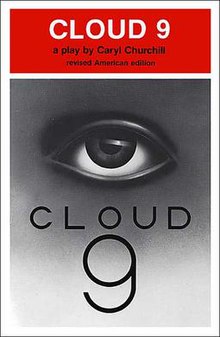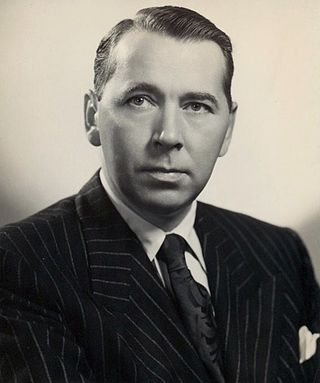
Alexander Knox was a Canadian actor and writer. He appeared in over 100 film, television, and theatrical productions over a career spanning from the 1920s until the late 1980s. He was nominated for an Oscar and won a Golden Globe for his performance as American President Woodrow Wilson in the 1944 film Wilson. However, his career in the United States was hampered by McCarthyism, and he spent the rest of his career in the United Kingdom.

Virginia Lilian Emmeline Compton-Mackenzie,, known professionally as Fay Compton, was an English actress. She appeared in several films, and made many broadcasts, but was best known for her stage performances. She was known for her versatility, and appeared in Shakespeare, drawing room comedy, pantomime, modern drama, and classics such as Ibsen and Chekhov. In addition to performing in Britain, Compton appeared several times in the US, and toured Australia and New Zealand in a variety of stage plays.

Top Girls is a 1982 play by Caryl Churchill. It centres on Marlene, a career-driven woman who is heavily invested in women's success in business. The play examines the roles available to women in old society, and what it means or takes for a woman to succeed. It also dwells heavily on the cost of ambition and the influence of Thatcherite politics on feminism.

A Walk in the Clouds is a 1995 period romantic drama film directed by Alfonso Arau and starring Keanu Reeves, Aitana Sánchez-Gijón, Giancarlo Giannini, Angélica Aragón, Evangelina Elizondo, Debra Messing and Anthony Quinn. An American-Mexican co-production, the film is an English-language remake of the 1942 Italian film Four Steps in the Clouds.

Ashley Churchill Williams is an American actress. She is known for starring in the television series The Jim Gaffigan Show on TV Land and in the NBC series Good Morning Miami. Williams played Victoria in 15 episodes of the CBS series How I Met Your Mother opposite Josh Radnor. She has starred in more than a dozen different television pilots over the years and done over 150 episodes of television in addition to television movies for The Hallmark Channel, Lifetime Television, and ABC Family. She has worked in studio and independent films, regional theater, Off-Broadway, and on Broadway.

Cavalcade is a 1933 American epic pre-Code drama film directed by Frank Lloyd. The screenplay by Reginald Berkeley and Sonya Levien is based on the 1931 play of the same title by Noël Coward. The film stars Diana Wynyard and Clive Brook.

Dame Harriet Mary Walter is a British actress. She has performed on stage with the Royal Shakespeare Company, and received an Olivier Award, and nominations for a Tony Award, five Emmy Awards, and a Screen Actors Guild Award. In 2011, Walter was appointed Dame Commander of the Order of the British Empire (DBE) for services to drama.
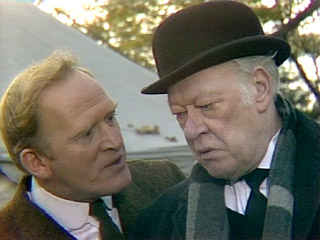
Clive Morton was an English actor best known for playing upper class Englishmen, he made many screen appearances, especially on television. In 1955, he appeared in Laurence Olivier's Richard III and is recalled by fans of Doctor Who for his role as prison governor George Trenchard in The Sea Devils in 1972. He played Commander Julius Rogue in the first series of the fondly-remembered children's TV series Rogue's Rock in 1974. One of his last roles was as an aged butler in an episode of Upstairs Downstairs.

Concetta Tomei is an American actress. She is known for her roles as Major Lila Garreau on the ABC drama series China Beach (1988–1991) and as Lynda Hansen on the NBC medical drama series Providence (1999–2002).
Vinegar Tom is a 1976 play by the British playwright Caryl Churchill. The play examines gender and power relationships through the lens of 17th-century witchcraft trials in England. The script employs features of the epic theater associated with German playwright Bertolt Brecht, particularly through use of song as well as the added anachronism of the actors, who performed music in modern dress, despite the play's 17th century setting. There were seven songs and twenty-one scenes. The play's title comes from the name of one character's pet cat, supposed to be her familiar spirit, likely inspired by the supposed imp of one Elizabeth Clarke, a woman tried and executed for witchcraft in Essex in 1645.
Far Away is a 2000 play by British playwright Caryl Churchill. It has four characters, Harper, Young Joan, Joan, and Todd, and is based on the premise of a world in which everything in nature is at war. It is published by Nick Hern Books. While some critics have expressed reservations about the play's ending, many regard Far Away as one of Churchill's finest plays.

The Beauty of Bath is a musical comedy with a book by Seymour Hicks and Cosmo Hamilton, lyrics by C. H. Taylor and music by Herbert Haines; additional songs were provided by Jerome Kern, F. Clifford Harris (lyrics) and P. G. Wodehouse (lyrics). Based loosely on the play David Garrick, the story concerns a young woman from a noble family, who falls in love with an actor. She then meets a sailor who appears identical to the actor and mistakes him for the latter. Her father objects to a marriage with the actor, but when it turns out that she really loves the sailor, all objections fall away.

Middle of the Night is a 1959 American drama film directed by Delbert Mann and starring Kim Novak and Fredric March. This story of a May-December romance was adapted by Paddy Chayefsky from his own 1954 teleplay and 1956 Broadway play, both of the same name. The film was entered into the 1959 Cannes Film Festival, where it competed for the Palme d'Or, and was released by Columbia Pictures.
Richard Stirling is an English writer and actor, who has appeared on film, television and the West End theatre and Off-Broadway stage. He studied at the Royal Academy of Dramatic Art (RADA). He has written arts features for newspapers and magazines. His 2009 play Seven Other Children was written as a response to Caryl Churchill's controversial play Seven Jewish Children.
The ARK Theatre Company is an actor-driven repertory theatre ensemble working in Los Angeles, California.
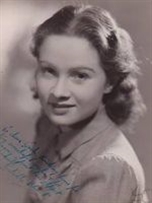
Gabrielle Hilda Blunt was a British actress. She had a very long career in theatre, film and television mainly working as a character actress appearing in many British television programmes and films.
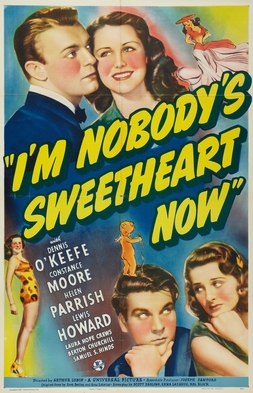
I'm Nobody's Sweetheart Now is a 1940 American romantic comedy film directed by Arthur Lubin and starring Dennis O'Keefe, Constance Moore and Helen Parrish. It was produced and distributed by Universal Pictures.
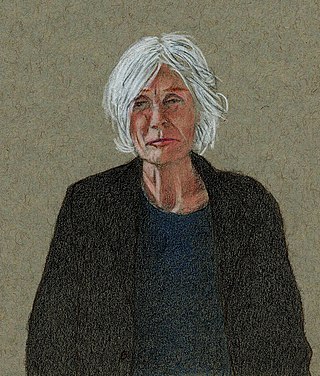
Caryl Lesley Churchill is a British playwright known for dramatising the abuses of power, for her use of non-naturalistic techniques, and for her exploration of sexual politics and feminist themes. Celebrated for works such as Cloud 9 (1979), Top Girls (1982), Serious Money (1987), Blue Heart (1997), Far Away (2000), and A Number (2002), she has been described as "one of Britain's greatest poets and innovators for the contemporary stage". In a 2011 dramatists' poll by The Village Voice, six out of the 20 polled writers listed Churchill as the greatest living playwright.
John Peter Tydeman OBE was an English producer of radio and director of theatre plays. He was responsible for commissioning and directing the early plays of Caryl Churchill, Joe Orton, Tom Stoppard and Sue Townsend.
James Macdonald is a British theatre and film director who is best known for his work with contemporary writers such as Caryl Churchill. He was associate and deputy director of the Royal Court Theatre from 1992 to 2006. There he staged the premiere of Sarah Kane's Blasted (1995), her highly controversial debut which sparked a Newsnight debate on BBC Television. He also directed the premiere of Kane's Cleansed (1998) and 4.48 Psychosis which opened after her suicide.
